AccessComputing News - December 2020
Below are the articles of the AccessComputing News - December 2020 newsletter. These articles can also be seen all on one page at the Full Newsletter option.
Jennifer Mankoff wins the 2020 AccessComputing Capacity Building Award
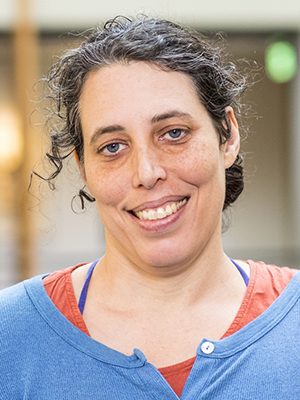
Every year AccessComputing honors someone with the AccessComputing Capacity Building Award for their work and accomplishments that have changed the way the world views people with disabilities and their potential to succeed in challenging computing careers and activities. This year the award goes to Jennifer Mankoff for her leadership in helping make all Special Interest Group on Computer–Human Interaction (SIGCHI) conferences accessible to attendees with disabilities. SIGCHI is the Special Interest Group of the Association for Computing Machinery (ACM) that focuses on research, education, and the practical application of human-computer interaction. She co-led the effort to create AccessSIGCHI that has a Facebook Group that currently has almost 300 members. She worked with the SIGCHI Executive Committee (EC) to set policy related to conference accessibility. Through her leadership, the SIGCHI EC now has adjunct chairs for accessibility, which institutionalizes accessibility as an important facet of SIGCHI activities. Jen holds monthly online meetings of the AccessSIGCHI leadership team to help set and execute its agenda. She also led the group in producing three SIGCHI Accessibility Reports (2015, 2017, 2019) with policy proposals that will help SIGCHI-sponsored conferences become more accessible. Jen is a professor in the Paul G. Allen School of Computer Science and Engineering at the University of Washington and is a co-founder and co-director of the Center for Research and Education on Accessible Technology and Experiences (CREATE) at the University of Washington. CREATE is an AccessComputing Partner. Congratulations to Jen on her outstanding work.
Learn about past AccessComputing Capacity Building Award recipients.
AccessComputing Colleagues in the News
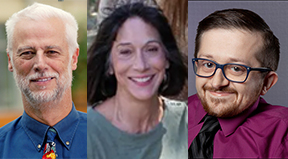
It is with great pleasure that we have seen some excellent coverage of our colleagues and their accomplishments this fall.
- AccessComputing and AccessCSforAll PI Richard Ladner received the Public Service Award from the National Science Board. This is a very prestigious award, which has been previously given to Jane Goodall and Bill Nye. Read more at The “conscience of computing”: Allen School’s Richard Ladner receives Public Service Award from the National Science Board.
- Long-time colleague Jeanine Cook from Sandia National Lab received the Richard A. Tapia Achievement Award for Scientific Scholarship, Civic Science and Diversifying Computing. Read more at CMD-IT (Center for Minorities and People with Disabilities in Information Technology) Announces 2020 Richard A. Tapia Award Winner Jeanine Cook.
- Another long time colleague, Rob Parke, who is a Senior Lecturer at the University of Southern California, was profiled as part of People of ACM. Read more at People of ACM - Rob Parke.
- AccessComputing Partner Jonathan Lazar received the Special Interest Group on Accessible Computing (SIGACCESS) Award for Outstanding Contributions to Computing and Accessibility. More info at SIGACCESS's Outstanding Contributions.
- AccessComputing Partner Ayanna Howard was named the next Dean of the College of Engineering at the Ohio State University.
Congratulations to you all for your great achievements!
Enhancing Accessibility in the ACM SIGCHI Research Community
Part of creating an accessible computing field is ensuring that people with disabilities can participate in all aspects of computing research—from attending professional conferences, to reading and writing articles, to volunteering within the community. The ACM SIGCHI computing research community just took an important step in this direction when it invited us (Soraia Prietch and Stacy Branham) to serve as the inaugural Adjunct Chairs of Accessibility on the organization’s Executive Committee. ACM SIGCHI is the Association for Computing Machinery’s Special Interest Group on Computer-Human Interaction, comprising nearly 3,000 students, academics, and professionals. The Executive Committee, which runs the organization, created the Adjunct Chair for Accessibility position to further its strategic initiative to promote inclusivity.

Soraia Prietch is a professor at the Federal University of Rondonopolis in Brazil, and Stacy Branham is an assistant professor at the University of California, Irvine. Together, we have dedicated over 20 years to advancing accessible computing through our research, teaching, and service. When we stepped into our role as Adjunct Chairs of Accessibility this past October 2020, the organization was already highly engaged in advancing access, with initiatives such as allocating budget for accommodations at conferences, creating processes for screen-reader accessible publications, and requiring virtual conferences to caption all videos. Additionally, independent volunteer efforts such as AccessSIGCHI have been advocating for accessibility on behalf of SIGCHI members with disabilities, including a bi-annual report that tracks the state of access.
The next several months will be crucial as we craft a plan for advancing accessibility in computing research in 2021. We are eager to learn from the members of AccessComputing in order to collectively build an understanding of how SIGCHI can provide more equal opportunities for students with disabilities. Please contact us at sigchi-access@acm.org if you have any recommendations, resources, or questions.
My DREU Experience
This year, I had the opportunity to participate in the Computing Research Association’s Distributed Research Experience for Undergraduates (DREU) through AccessComputing. I have been involved in AccessComputing since my sophomore year, attending the CS@UW+AccessComputing research workshop in the spring of 2019. Prior to my participation in this workshop, I never thought of research as a viable path for me.
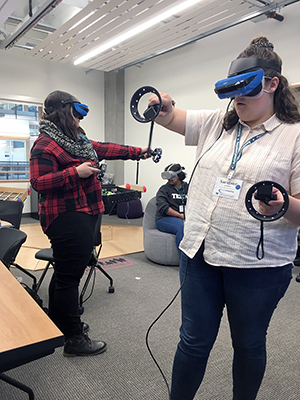
At CS@UW+AccessComputing, I had the opportunity to participate in research-based projects under Professor Anat Caspi, head of the University of Washington’s Taskar Center for Accessible Technology (TCAT). During the weekend, I was able to participate in research seeking to make Virtual/Augmented Reality accessible to individuals with motor impairments. The way that I learned my brain could ask questions, seek solutions, and learn along the way opened my eyes to the possibility of research in my future.
After conducting independent research at the University of Puget Sound, my home institution, in the summer before my junior year, I knew that participating in the DREU was something that I wanted to pursue. Just before applying to the DREU, AccessComputing provided me the opportunity to go to the Grace Hopper Celebration (GHC), which enabled me to find a community that sustained me throughout my undergraduate coursework.
When applying for the DREU, I knew that I wanted to conduct research in the areas of human computer interaction and/or accessible technology. Because of my exposure to these fields at the research workshop, I began to notice not only a growing passion within myself for this work but also the gaps at my home institution. For this reason, I knew that the DREU was my next step.
After the application process, I was paired with a faculty mentor. I was delighted to learn that I would get to work with Professor Caspi again. Once we started meeting to develop a plan for my DREU, I was amazed at the amount of agency I had over what I would be working on.
Ultimately, I started working on the Taskar Center for Accessible Technology’s OpenSidewalks Project, which focuses on pedestrian-based transportation networks and access to pedestrian-centric infrastructure. My project fell under the OpenSidewalks Project’s efforts to ensure equitable data collection regarding pedestrian networks.
I was tasked with developing a prototype for an app to collect information on the accessibility for pedestrians at various intersections. The goal of the project was to develop an Android application that could be used by any user to document the presence of various accessibility features at the intersection (such as Accessible Pedestrian Signals, curb ramps and curb ramp placement, and traffic speed). A key interest was in how to collect consistent data when trying to gain insight on somewhat subjective topics (such as whether traffic is going above or below the speed limit).
In addition to thinking about this question, I spent a large chunk of my summer learning how to create an Android application that would be intuitive for users. I ultimately developed a functional app and gained experience in user testing, design, and research.
Through my participation in the DREU, I gained research experience in areas that I did not have access to at my home institution, gained a faculty mentor, and got to meet and be a part of a lab. I was fortunate to attend the Tapia Celebration of Diversity in Computing and present my research at Grace Hopper. This was such an amazing experience, and I cannot express enough how grateful I am to AccessComputing, the Computing Research Association, and Professor Caspi for fostering my growth as a researcher this summer. If you are interested in learning more about my DREU experience, or reading the final report, you can visit my DREU site.
(Photo on this newsletter page is from CS@UW+AccessComputing 2019).
AccessComputing Profile: Kiara Benson
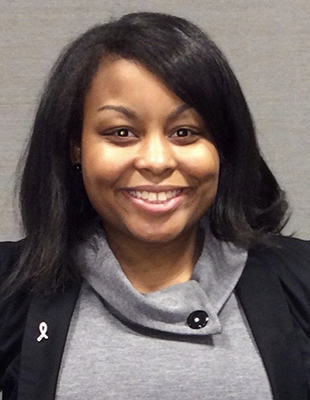
Hi my name is Kiara Benson from Memphis, Tennessee. I attend Tuskegee University majoring in Electrical Engineering with dyslexia and attention deficit hyperactivity disorder (ADHD). In the third grade my parents bought me my first computer, and my dream to be an engineer was born. Every time someone asked me what I wanted to be when I grew up, I would always say an engineer just like Katherine Johnson. So many people would tell me engineering is hard and not many minority women are in engineering. I never let the negative words of others stop me from wanting to achieve my goal of becoming an electrical engineer. In elementary school, I struggled in my math classes. My parents bought me math computer games and hired me a tutor to help me succeed. Because my parents invested in resources to help me, I worked even harder in those subjects.
In college, I struggled in some of my courses, not because I was not smart enough, but because I couldn’t grasp the way the professor taught the subject. I would stay up all night studying, spend extra time at tutoring sessions, and visit professor and TA office hours. One of my computer science professors noticed that I understood the material, but that I couldn’t test well. He suggested that I may learn differently; this led me to get tested, where I found out that I had a learning disability. I also learned that it’s normal for many people to find out they have a learning disability when they are in college or later in life. I transferred to Tuskegee University, which is a historical black college and where the student to professor ratio was much smaller. Tuskegee has some of the best faculty and staff. Many of my professors worked extra hours to help me and were patient. Tuskegee made me realize that black women like me can get a degree in engineering. I still cannot believe this is my last semester in college. I have completed multiple internships and research while at Tuskegee University. AccessComputing has granted me many opportunities and surrounded me with great people, creating one of the first environments where I don’t feel ashamed of my learning disability. AccessComputing also provided me with a scholarship to attend the Tapia Conference. It was the first time in my life I felt like I belong in engineering as a minority and engineering student with a learning disability. I went to workshops and heard professional scholars speak on their disabilities, and it motivated me to continue to strive to greatness. I would like everyone to know who is reading this that anyone can be an engineer. Don’t let the struggles, self-doubt, and naysayers stop you from achieving. I wouldn’t have made it this far without my supportive parents, family, mentors, friends, tutors, and the illustrious Tuskegee University. My journey to becoming an electrical engineer has been an uphill battle, but I am continuing to succeed.
OurCS@AccessComputing+CREATE
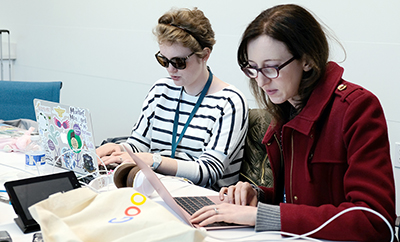
OurCS@AccessComputing+CREATE is a research-focused workshop for undergraduates with disabilities in computing fields to be held virtually on Wednesday, January 13 through Friday, January 15, 2021, 9 am – 12 pm Pacific Standard Time (PST).
Students with disabilities nationwide in computing fields are eligible to apply. Students will participate in research explorations designed to inspire participants to consider research careers and meet mentors with disabilities.
Students who participate in the entire program will receive a $50 stipend. Funding for this workshop is provided by Google Explore CSR with additional support from AccessComputing and the UW Center for Research and Education on Accessible Technology and Experiences at UW (CREATE).
For full consideration, please apply now! Applications are still being accepted on a space available basis.
2020 ASSETS Conference
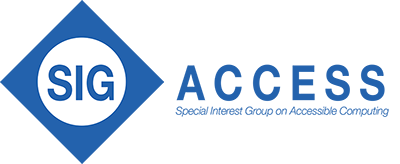
The 22nd International ACM SIGACCESS Conference on Computers and Accessibility was held virtually on October 26-28, 2020. The conference was originally to be held in Athens, Greece, but the pandemic forced it to be virtual. Although the virtual format was somewhat difficult to navigate, it was successful thanks to the great work by the organizers. AccessComputing was well represented among the organizers with AccessComputing Partners Hernisa Kacorri, Treasurer; Jonathan Lazar, Doctoral Consortium Co-Chair; and Raja Kushalnagar, Student Research Competition CoChair, as well as AccessComputing Team Members Larwan Berke, Accessibility Co-Chair; Dhruv Jain, Posters and Demonstrations co-Chair; and Cole Gleason, Proceedings Chair.
There were 395 attendees including 210 students, both record numbers. The average Zoom attendance in each session was over 100. The conference was highly accessible using 13 sign language interpreters (both American and British sign language) and 12 captionists. The Zoom platform was used for the sessions along with Discord for discussion. There were more than 100 Discord channels for the various papers, posters, and demos. Discord also could be used for one-on-one text conversations.
One highlight of the conference was the keynote address at the beginning of the conference by AccessComputing partner representative Jonathan Lazar, the 2014 winner of the AccessComputing Capacity Building Award. His talk, titled “Accessibility Research in the Pandemic Making a Difference in the Quality of Life,” covered many of the issues facing people with disabilities during the COVID-19 pandemic and how the accessibility research committee is responding. His final words were a call to action for the community: “We have the ability to make a huge difference right now! We have the power to save lives. Let’s get to work!”
Of the 57 papers published this year, 20 had at least one author who is an AccessComputing Partner or AccessComputing team member. Of the 67 posters and demos, including those from the Doctoral Consortium and Student Research Competition, 5 had at least one author who is a partner or team member. The Best Student paper was “Living Disability Theory: Reflections on Access, Research, and Design,” with lead author Meagan Hofmann, AccessComputing Team member finishing up her Ph.D. at Carnegie Mellon University, and coauthors Jennifer Mankoff, AccessComputing Partner, Cynthia Bennett, former AccessComputing Team member, now a postdoc, and Devva Kasnitz, a well-known disabilities studies scholar. The paper delineates three themes: ableism in research, oversimplification of disability, and human relationships around disability based on the lived experiences of the four authors and looking through the disabilities studies lens. In the end, they give concrete advice to accessibility researchers that will enable them to pursue research that respects and dignifies the lives of people with disabilities. They advocate building bridges between the accessibility research and disability studies communities.
Get Involved with AccessComputing
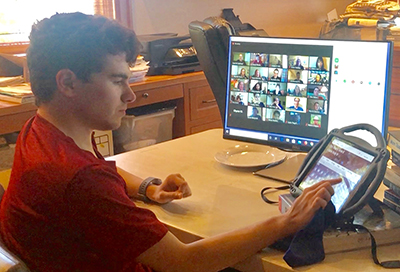
AccessComputing helps students with disabilities successfully pursue undergraduate and graduate degrees in computing fields. We also work to increase the capacity of postsecondary institutions and other organizations to fully include students with disabilities in computing courses and programs.
There are several opportunities to get involved:
-
Students with disabilities can join the AccessComputing student team and become involved in our mentoring community (as well as become eligible for funding for conferences and REUs). There is a short application online to join.
-
Professionals with (or without) disabilities can mentor students with disabilities within our community. The mentor application is also online; Mentors should note that they want to work with STEM students in question #6.
-
Anyone can join a Community of Practice. These are email discussion lists where we share resources and opportunities and discuss topics related to accessibility in computing.
-
Faculty can become an AccessComputing partner. Our partners make a commitment to working on making their institution or organization more welcoming and accessible to individuals with disabilities. Our partners meet monthly for discussions on related topics.
If you're interested in getting involved, but have questions, email Brianna Blaser <blaser@uw.edu>.
2020 State of Computer Science Report
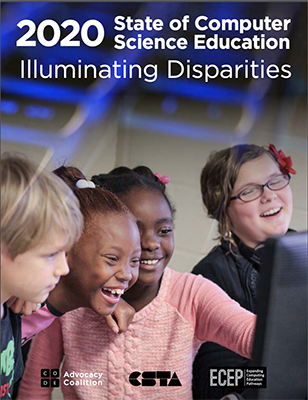
The "2020 State of Computer Science Education: Illuminating Disparities" was just released and can be downloaded. This report details the progress made by all 50 states and the District of Columbia in adopting policies and initiatives for K-12 computer science education. For the first time it contains data about disability reported from 11 states (see pages 17 and 95). In 2019, in the 11 states 12.9% of K-12 students in public education were served by the Individuals with Disabilities Education Act (IDEA), while only 7.6% of students who took at least one computer science course were served under IDEA. This is significant because data on students with disabilities in K-12 computing courses is often not collected or reported. Also, for the first time, data on English language learners and students eligible for free and reduced-price meals is reported. It is worth noting that in 2019 the relative representation of students with disabilities (under IDEA) in computer science courses is at about the same level, 7.6/12.9 = 58.9%, as women 29/50 = 58.0% taking AP computer science courses.
The report also highlights the work of Amanda Rodda at the Washington State School for the Blind and Sarah Ciras at the Landmark School that serves students with learning disabilities, both of whom participate in the AccessCSforAll project that addresses accessible computer science education at the K-12 level.
Congratulations to the teams at the Code.org Advocacy Coalition, CSTA, and ECEP for putting together this very informative report on computer science progress in K-12 education.
Accessibility and Online Conferences
In the July 2020 edition of AccessComputing News, the article Accessibility and Third-Party Products and Services described the critical need to consider accessibility early when shopping for technology solutions, and recommended addressing accessibility at three stages of the procurement process: Soliciting accessibility information from vendors; validating the accessibility information received; and including accessibility assurances in contracts. Online conferencing platforms provide an excellent example of this need.
As most conferences have moved online since early 2020, they have turned to the use of a variety of technologies in an effort to replicate the functionality of face-to-face conferences. Conferences commonly feature presentations, an agenda or schedule of events, opportunities for networking and discussion among attendees, exhibitors demonstrating their products and services, and poster sessions.
Unfortunately, many of the platforms and tools used by conferences for providing these functions online do not currently meet accessibility standards and consequently are difficult, if not impossible, for people with disabilities to use. For example, screen reader users depend on properly coded page structure, with headings that form an outline of the page and particular page regions (e.g., banner, navigation, and main) explicitly identified in the underlying HTML code; users who are physically unable to use a mouse must be able to access all links, buttons, and controls with keyboard alone; and users who are unable to hear the presenters depend on captions and expect to have some control over how those captions are displayed. Most, if not all, online conference platforms fail in one or more of these areas.
In order for this situation to change, conference organizers must demand accessible products. The more vendors hear from their potential customers that accessibility is an important consideration – maybe even a deal-breaker – the more likely they will be to recognize the market demand for accessibility. This is a wide-open opportunity for any vendor that embraces accessibility, as they can be first to market with an accessible product.
Meanwhile, conference organizers, despite the lack of accessible choices for online conferencing platforms, still need to provide accessible conference experiences. They cannot simply discriminate against people with disabilities and provide conference features that are only available for non-disabled attendees. This requires working proactively with their chosen vendor as early as possible in the negotiation process, to try to help them recognize the implications of their accessibility failures and commit to fixing them. Whenever possible, accessibility expectations including a timeline for fixing known issues should be included in the contract. It also requires thinking creatively about workarounds, in case vendors fail to deliver an accessible solution on time.
The following case studies describe how two conferences, both of which have long histories as face-to-face events, went fully online in fall 2020, and responded creatively to the need for an accessible conference solution.
Case Study 1: Richard Tapia Celebration of Diversity in Computing Conference
The Tapia Conference is an annual fall conference that seeks to acknowledge, promote, and celebrate diversity in computing. AccessComputing had representation on the Infrastructure Committee for the 2020 conference. Tapia chose vFairs as its online conferencing platform. vFairs provides a virtual experience that visually resembles a face-to-face conference, including an on-screen replica of an interactive lobby, exhibit hall, and auditorium. The virtual conference spaces even include virtual attendees mingling and browsing, and Tapia worked with vFairs to ensure those attendees had diverse characteristics, including people with visible disabilities such as wheelchair users and people using white canes.
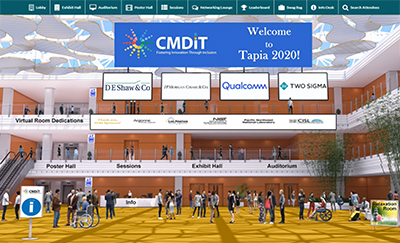
Although visually compelling, vFairs had major problems with accessibility for attendees who are blind or visually impaired, as well as other attendees who use assistive technologies or custom configurations. AccessComputing staff, on behalf of Tapia, conducted an accessibility review of the platform and met with vFairs representatives on two occasions to discuss the most significant problems and describe possible solutions. The parties shared an online document in which progress was tracked on each of these issues. vFairs made some progress, and was able to fix a few of its problems, but ultimately, they ran out of time so many of the accessibility fixes were "in progress" but not deployed in time for the conference.
As a workaround for the accessibility issues, Tapia provided attendees with a guide to navigating the conference environment with a screen reader. This guide included key landmarks and workarounds for navigating through the otherwise inaccessible features of the conference platform.
After the conference, vFairs representatives agreed to meet with a panel of conference attendees who have disabilities (three screen reader users and one attendee who uses eye-gaze technology in combination with Dragon speech-to-text software). The attendees described the challenges they faced in navigating and using the software, which helped to reinforce to vFairs that the work they had started would benefit actual users, and accessibility was not just an abstract technical specification.
Case Study 2: Accessing Higher Ground
Accessing Higher Ground (AHG) is an annual fall conference focused on accessible media, web and technology in higher education. AccessComputing had representation on the Program Committee for the 2020 conference. AHG actively sought recommendations for an accessible conferencing platform, but as noted above, all available products seem to fall short on accessibility, so AHG chose Whova, despite its known accessibility problems.
AccessComputing staff, on behalf of AHG, conducted an accessibility review of the platform and provided a report to the vendor that included code-level recommendations for solutions to the most significant problems. At Whova's request, a meeting was set up to ensure they understood the report, and these issues were then handed off to the engineering team. However, they were unwilling to commit to fixing their accessibility problems in time for the conference, nor were they willing to offer a timeline by which the problems might be addressed.
Since AHG is a conference about accessibility, and since many of the attendees are known to have disabilities, AHG especially needed a workaround. Their solution was to develop a userscript, a JavaScript file that runs in a browser extension such as Greasemonkey or Tampermonkey, and fixes many of Whova's accessibility problems client-side, after Whova has loaded in the browser. This was created by AccessComputing staff as an open source project called Whova Accessibility Fix, hosted on GitHub. Conference attendees, particularly those who use screen readers, spoke fondly of this solution. As one attendee said in an email, "I can use the Whova desktop app without issue. Thanks to you and your sweet JavaScript band aid."
With more time to promote this effort, this could potentially be an effective means of building community around accessibility. Anyone who has JavaScript skills and/or web accessibility skills could participate in developing the solution in collaboration with others as part of a team, and could learn new skills as part of the effort.
However, despite its positive side, this solution has its drawbacks. It's essentially a hack, based on a snapshot in time of the application it's seeking to fix. If the company rolls out any changes, this could very easily break the solution, and since the solution is created independently of the company, there is no communication between the parties. Also, this solution may provide vendors with a false sense of relief from responsibility to fix their accessibility bugs. It's already difficult to persuade vendors to fix accessibility of their products. They may be even less motivated to do so if they believe their customers can use a fallback solution to avoid discriminating against their participants.
Logistical Considerations
In addition to choosing – to the extent possible – an accessible online conferencing platform, conference organizers can take many other steps to ensure their conferences are accessible. For example:
- Provide a means on the conference registration form for attendees or presenters to request accommodations.
- Be prepared to provide accommodations when they're requested, such as live captions or sign language interpreters. Identify vendors who provide these services and be prepared to use them. It is important to make arrangements early, to understand the steps for enabling these services in the chosen conference platform, and to relay that information to anyone who needs it (hosts, moderators, presenters and/or attendees). In 2020, demand for captioning has increased dramatically, so skilled captioners are in short supply, which means making arrangements early is especially important. Also, note that conference participants who need captioning and interpreting will need these accommodations for all parts of the conference, not just for presentations (e.g., for interacting with exhibitors and for networking events).
- Provide live captions and sign language interpreters proactively for large events such as keynotes, plenaries, and featured sessions.
- Provide information to speakers about how to ensure their presentations (e.g., PowerPoints and digital handouts in Word or PDF) are fully accessible, with alt text for images, proper heading structure in handouts, and adequate color contrast.
- If the conference includes pre-recorded videos of presentations, be sure to caption all videos.
- Another common accommodation request is access to presentations and slideshows. Again, proactively collecting presentations and sharing them with attendees can ensure everyone has access.
Our Institutions During the Pandemic
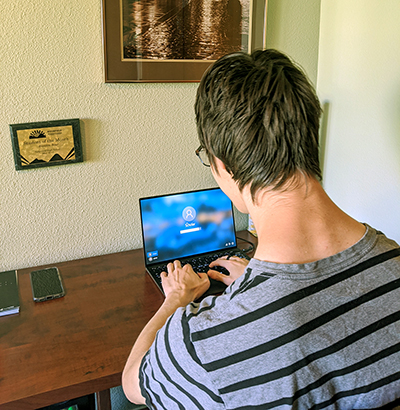
The pandemic has impacted our personal and professional lives in so many ways. One area that is of particular concern to me is the proliferation of inaccessible online courses. I have never met a faculty member who intentionally ignores the needs of any particular groups of students who might enroll in their classes; nevertheless, many are doing just that. Many current pedagogical and technology design practices result in barriers that negatively impact students with disabilities. Barriers include those that impact students who are blind and use screen readers to read aloud text presented on the screen, who are deaf and cannot access audio components in a course, and individuals who have reading-related disabilities who benefit from using text-to-speech technology so that printed materials can be read aloud to them. So what does all this mean with respect to the design of information and communication technology? A few tips that address access issues for these students in online learning include to
-
Use clear, consistent layouts and organization schemes for presenting content.
-
Structure headings and lists—using style features built into the Learning Management System (LMS), Microsoft Word and PowerPoint (PPt), PDF, etc.—and use built-in layouts (e.g., for PPt slides).
-
Use descriptive wording for hyperlink text (e.g., “AccessComputing Knowledge Base” rather than “click here”).
-
Avoid creating PDF documents (trust me, they can be challenging to make accessible and even more challenging to remediate). Post instructor-created course content within Learning Management System content pages (i.e., in HTML) and, if a PDF is desired, link to it only as a secondary source of information.
-
Provide concise text descriptions of content presented within images.
-
Use large, bold fonts on uncluttered pages with plain backgrounds.
-
Use color combinations that are high contrast and can be read by those who are colorblind.
-
Caption videos and transcribe audio content.
-
Use a small number of IT tools and make sure they present content and navigation that require use of the keyboard alone and otherwise employ accessible design practices.
For links to useful resources for an explanation of why a tip is important and steps for applying these tips along with 11 that focus on the pedagogy used in a course, consult the publication 20 Tips for Teaching an Accessible Online Course. Link to this resource on department/campus resource pages for faculty or share it with colleagues who teach courses online and thereby contribute to making your institution’s practices and information accessible, usable, and inclusive.
For Your Bookshelf
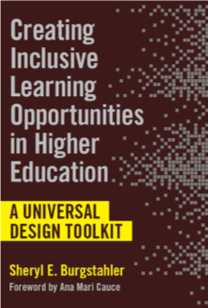
Harvard Education Press has published my new book, Creating Inclusive Learning Opportunities in Higher Education: A Universal Design Toolkit. With content that integrates content related to accessible technology design in every chapter, it is particularly relevant to these times when so many courses and services have moved online. I also share myriad ways disability, accessibility, and universal design topics can be integrated within the curriculum of computing and other postsecondary courses.
In this publication I offer a practical, step-by-step guide to put the principles of universal design to work in all that we offer in higher education. Addressing the need for systemic change in order to dismantle institutional inequities, I share strategies that can be offered to all students enrolled in classes and using campus services and applied to the design of technology to avoid the creation of access barriers and build a more inclusive campus.
The book has broad appeal for faculty, administrators, and support staff interested in advancing diversity, equity and inclusion for all students on any campus, and includes specific examples relevant to students with disabilities. As shared by AccessComputing partner and chief executive officer and president of the Center for Minorities and People with Disabilities in IT, Valerie Taylor: “While this excellent book focuses on practical steps to provide inclusive environments in higher education, Burgstahler's recommendations are relevant and applicable to the broader community as well.” Margo Izzo, professor emeritus of Ohio State University, further elaborates: “Sheryl Burgstahler's passion for inclusion is grounded in personal, academic, and professional experiences. She provides an opportunity for the reader to ‘Take Action’ by reflecting, learning, and applying new concepts. This book is an excellent mixture of practical examples and useful strategies for administrators and faculty who strive to make their college campus more inclusive, diverse and universally designed!”
This publication complements Universal Design in Higher Education: From Principles to Practice, second edition, that I edited and is also published by Harvard Education Press. In this book, I and 40 other chapter authors and co-authors make the case for the application of universal design to teaching and learning, campus services, physical spaces, and technology.
2020 Tapia Celebration of Diversity in Computing
The 2020 Tapia Celebration of Diversity in Computing was held virtually from September 16-18. AccessComputing supported 27 students from its AccessComputing team to attend. AccessComputing project manager, Brianna Blaser, chaired the accessibility committee that helped make the conference accessible. AccessComputing staff member, Terrill Thompson, helped evaluate and advise on the accessibility of the online platform. The online AccessComputing booth had plenty of visitors during the three days. AccessComputing Partner representatives Rob Parke, representing the University of Southern California, was the program chair and Patti Ordóñez, representing University of Puerto Rico – Río Piedras, served as program deputy chair. Other partner representatives, Stephanie Ludi, from University of North Texas, and Samuel Rebelsky, from Grinnell College, also played important planning roles for the conference. And, partner CMD-IT (Center for Minorities and People with Disabilities in Computing and Information Technology) is the presenter of Tapia.
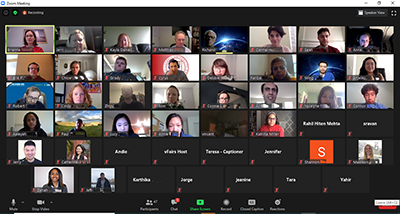
Four AccessComputing Team members gave presentations at the conference:
- Barış Ekim, “A Randomized Parallel Algorithm for Efficiently Finding Near-optimal Universal Hitting Sets”
- Ramin Ayanzadeh, “Can Artificial Intelligence Advance Quantum Information Processing?: A Study Case on AI Hybrid Quantum Annealing”
- Milind Agarwal, “Multiplotlib: a multi-view visualization and analytics library”
- Huy Tu, “The Changing Nature of Computational Science Software”
JooYoung Seo, who is finishing up his PhD dissertation at Penn State, gave a talk in the Tapia Doctoral Consortium titled: “Discovering Knowledge Sharing Patterns of Blind People Pursuing STEM Disciplines: Data Science and Computational Linguistics on Large-Scale Email Corpora.”
AccessComputing sponsored multiple sessions at the conference:
- Birds of a Feather: “Diversity Includes Disability” led by Brianna Blaser and Richard Ladner
- Birds of a Feather: “Mental Health in Computing Students and Professionals” led by Brianna Blaser, Adam Blank, Kendra Walther, Nicholas Lytle, and Kayla Brown
- Panel: “Disability Disclosure in Education and Employment” moderated by Brianna Blaser with panel members Jeanine Cook, Lauren Gaber, Anna Kirkpatrick, and Adrian Trejo Nuñez
- Panel: “Inclusive Hiring Practices for People with Disabilities” moderated by Brianna Blaser with panel members Neil Barnett from Microsoft, Catherine Nichols from Salesforce, and Lorne Needle from Google
There were also other sessions that addressed disability and/or accessibility:
- Panel: “Increasing Diversity in Computing: Sharing Good Practices” that featured the Broadening Participation in Computing Alliances, including AccessComputing
- Panel: “It Takes a Village: Creating and Implementing an Autism to Work Program for Students”
- Plenary: “Tapia Student Attendees, Now Early Career Professionals” whose speakers included former AccessComputing Team member Ivan Brugere
- Panel: “Executing a Commitment to Disability Inclusion and Accessibility for Employees and Customers” that focused on industry commitments to diversifying their workforces with people with disabilities
- Workshop: “Dark Patterns Through the Lens of Accessibility” that examined how websites trick people into clicking on links making them do actions unintentionally; these tricks can be especially onerous for people with some kinds of disabilities.
This year was the first year that the Tapia Conference went virtual and from our perspective it was successful. Congratulations to CMD-IT and the organizers in making it all work.
AccessComputing offers Webinars for Computing Educators and Employers
AccessComputing can lead online presentations and discussions for your department, institution, organization, or another group of colleagues. Time could be set aside during the session to discuss specific strategies that your department or organization could utilize to move towards becoming more welcoming and accessible to students with disabilities or how you could include accessibility topics in your instruction or research.
Below is a short list of some of the presentations that we can offer.
- Integrating Disability-Related Topics in a Computing Course
- Accessibility is Becoming Mainstream
- Introduction to Ability-Based Design
- Panel of Students with Disabilities in Computing
- Perspectives of People with Disabilities Regarding Accessibility
- Teaching an Accessible Online Course
- Accessible Online Meetings and Presentations
- Designing Accessible Documents, Videos, and/or Websites
- Accessibility and Third-Party Products and Services
- Universal Design of Teaching and Learning
- Why is Data on Disability so Hard to Collect and Understand?
- U.S. Laws about Accessibility
- Tailor-Made Talk, Panel, or Discussion
See Host a Webinar for more information about webinars and to request one for your organization.
New Program to Increase Advancement of Women with Disabilities in STEM Faculty Careers
We are pleased to announce that the DO-IT Center at the University of Washington is funded to establish and lead AccessADVANCE, a project aimed at increasing the participation and advancement of women with disabilities in science, technology, engineering, and math (STEM) academic careers. This project, a collaboration between the North Dakota State University and the University of Washington funded by the National Science Foundation, will begin January 2, 2021.
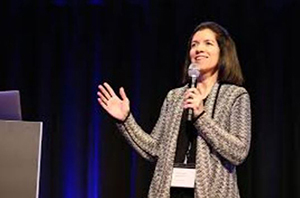
Women with disabilities in STEM fields is an understudied, underserved, and often invisible population. Our program will engage with women with a variety of disabilities as they progress through academic and career milestones. “To effectively support female STEM faculty, attention to disability issues must be woven into the entire sociotechnical ecosystem of STEM departments,” states Cecelia Aragon, AccessADVANCE Co-PI and University of Washington professor and director of the Human-Centered Data Science Lab. She reports that “Many diversity efforts, even those that aim to take an intersectional approach with regard to race and gender, do not address disability.”
AccessADVANCE will aim to create systemic change to promote women in STEM so that those with disabilities who enter academic positions feel welcome, are fully included, and can achieve success. It will focus on working with postsecondary STEM departments and other organizations, as well as create resources and a searchable knowledge base regarding the inclusion and accessible participation of women of women with disabilities in academic STEM careers. “We are excited about expanding and building partnerships across the country as we work to make sure that women with disabilities can be successful as faculty members in STEM fields,” said project PI and director of UW-IT’s Access Technology Services and DO-IT Center Sheryl Burgstahler.
To create truly inclusive and equitable academic workplaces, it is imperative to systematically address issues impacting the career advancement and success of female STEM faculty with disabilities. “Ultimately, AccessADVANCE will broaden participation in STEM academic careers and improve those fields with the talents and perspectives of female faculty with disabilities, and thus enable a richer and more effective STEM community for all,” Aragon said.
This project is funded by the National Science Foundation for over $1,000,000 and will run for at least 5 years, led by three leaders in disability, equity, and inclusion: PI Sheryl Burgstahler (University of Washington), PI Canan Bilen-Green (North Dakota State University), and Co-PI Cecilia Aragon (University of Washington). The Associate Director of the project is Brianna Blaser.
“In higher education, it is often assumed that a person with a disability is a student. We look forward to advancing conversations that remind people that people with disabilities are present throughout academia,” Burgstahler said.